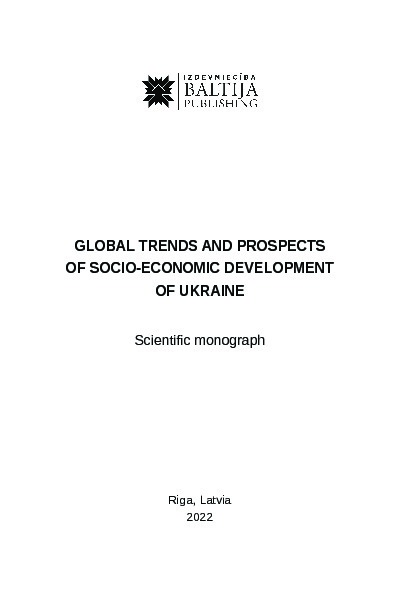id: 30849
Title: Analytical information in the management of agricultural enterprises in the conditions of European integration.
Authors: Tomchuk О.
Keywords: analysis, information, integration, agricultural enterprise, management.
Date of publication: 2022-04-21 20:00:28
Last changes: 2022-04-21 20:00:28
Year of publication: 2022
Summary: The purpose of the article is to substantiate a set of theoreticaland practical principles for provision of analytical information to the management system of agricultural enterprises. Methodology. Methods of theoretical generalization and concretization, Internet resources have been used in this study. Results. Two interacting systems, namely a managing and managed ones, have been identifed. The managing system involves the subjects of management, i.e. the apparatus of enterprise management. It is the managing system that implements the main functions of management (planning, organization, motivation, control) through management decisions. The managed system involves the object of management, i.e. it is economic (operational, investment, fnancial) activities of the enterprise. The process of business management is carried out through the collection of information about the object of management and the results of previous decisions, analysis of this information and making new management decisions based on such analysis. The objects, stages and technology of organization of analytical process are formed. The integration of approaches, methods and models of support for management decision-making at the agricultural enterprise is revealed, namely indicator method, resourcefunctional approach, integrated approach, approach based on the theory of economic risks. The fnancial and economic activity of LLC “Courland” in the context of using information support in its management system by the main economic indicators of resources and results, production program and level of marketability of the main agricultural products, liquidity of the balance, fnancial stability and solvency, business activity, indicators of proftability of the enterprise. It is substantiated that the introduction of management system and timely data processing allowed the company to achieve positive changes in the results and form trends towards the growth, organize the work of structural units, main activities, and to achieve economic effect. Organizational regulations on the organization of analytical service and coordination of work of persons engaged in analysis and conducting analytical work are proposed. It is proved that Regulations on the Analysis Department should be the main organizational regulation, on the basis of which the methodological guidance, organization and conduct of economic analysis at the enterprise is carried out. Practical implications. Taking into account the impact of features of the agriculture on the formation of analytical information enables to carry out a comprehensive assessment of economic and social results, to develop quantitative and qualitative indicators of efciency. Value/originality. The integration of approaches, methods and models that has been considered will increase the rationality of management decisions by adjusting the probability of the event occurrence and selecting the best project among the alternatives by the criterion of proft maximization. Implementation of the management system and timely data processing allowed the company to achieve positive changes in the results and to form growth trends, organize the work of structural units, the main activities, and to achieve the economic effect. Determination of management elements in the digital space will let domestic enterprises take a proper place in the international cooperation and competitive advantages in the market.
URI: http://socrates.vsau.edu.ua/repository/getfile.php/30849.pdf
Publication type: Монографії видані за кордоном
Publication: Scientifc monograph. Riga, Latvia: Baltija Publishing, 2022. P. 349-378.
In the collections :
Published by: Адміністратор
File : 30849.pdf Size : 3319579 byte Format : Adobe PDF Access : For all

| |
|
|